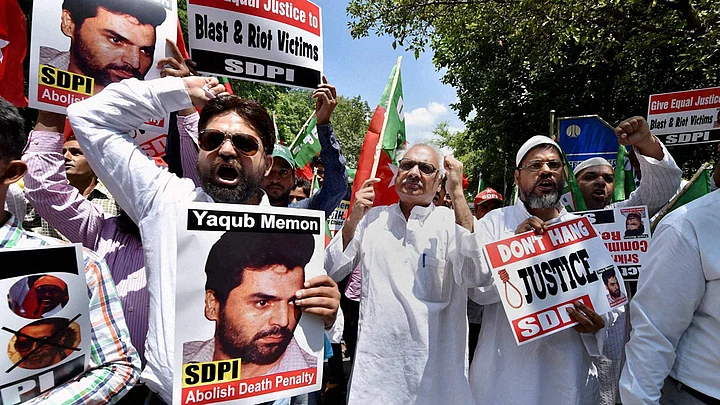Breaking News: Supreme Court dismisses Yakub Memon’s curative
petition. Mercy plea rejected by President. Inspite of late night drama, Memon’s fate sealed. Hanged at Nagpur Jail in the early hours of Thursday, July 30.
Raghukul reet sada chali aayi; pran jayein par vachan na jaayi (Citizens of Lord Ram’s country would prefer to die rather than renege on their commitment).
We have all grown up with tales from the Ramayana, where Lord Ram gave up his Kingdom to keep a vow his father had made to his stepmother. Even otherwise, for hundreds of years, India’s trade and commerce has been hitched to the zubaan, which literally means a word that has come off one’s tongue. Ek baar zubaan de di, toh de di – meaning, once I have given you my word, there is never any going back on it. Deals worth billions of rupees get done in India on just the zubaan of a trusted person. That is our heritage, our national credibility.
Yakub Memon’s hanging has re-ignited the age-old debate around capital punishment. Protagonists for and against judicial execution trotted out their convictions, either calling it “a state-sanctioned murder” or “the ultimate crime inhibiting punishment”. The somewhat independent question of whether Yakub Memon should have been given the death penalty or not got seamlessly embroiled in this larger debate. You wanted him hanged if you were for capital punishment; if not, you wanted his sentence to be commuted to life imprisonment.
Benefit of Doubt Deprived
I view Yakub Memon’s case from a different lens. To me, it is about vachan and zubaan. It is now utterly clear that an implicit promise was made to Yakub Memon – one that is made to almost every accused person who becomes an approver – that he would get a relatively lenient sentence; that is, if he merited the harshest punishment, it would be mitigated to a notch or two lower than that. Of course this deal could not be written into a formal contract, with stamp duty paid at Tiz Hazari courts. Of course no politician or bureaucrat could risk the wrath of the unknown by putting his signature to such a document. Clearly the understanding was made in good faith, on trust, on zubaan.
For a minute, read between the lines of this extract from an unpublished article written by the late B Raman, then the Head of the Pakistan Desk at RAW (the authenticity of Raman’s assertions in this article has now been established by various sources; so that’s not a point of contention):
“In July 1994, some weeks before my retirement, he was informally (emphasis mine) picked up in Kathmandu, with the help of the Nepal police, driven across Nepal to a town in Indian territory, flown to Delhi by an aircraft of the Aviation Research Centre and formally arrested in Old Delhi by the investigating authorities and taken into custody for interrogation. The entire operation was coordinated by me (emphasis mine) … In their (ie, prosecution’s) eagerness to obtain the death penalty, the fact that there were mitigating circumstances (emphasis mine) do not appear to have been highlighted.”
Now just imagine if the late B Raman had testified under oath in a court of law. Wouldn’t the judicial trajectory have changed completely? Shouldn’t then the accused have got the benefit of doubt since B Raman is not around to take the witness box? Couldn’t his categorical reference to “mitigating circumstances” be treated as an “informal” affidavit? Especially since another key officer, Shantanu Sen, who led the CBI team probing the 1993 Mumbai blasts, confirmed in a TV interview that the agency used its contacts in Pakistan to “induce (emphasis mine) the Memons to believe that their safety lay in India”.
Moral Dilemma
Now if a government picks up a terror accused person informally, in another country, after inducing him to believe that his safety lay in putting his faith in the mitigating circumstances that it would create for him during his trial, gosh, do you really need a contract on a notary stamped paper to prove that an implicit deal was done?!
So the honourable thing for India to have done is what Lord Ram would have done – stuck to his vachan, zubaan, word, commitment. This is exactly what the Americans have done with David Coleman Headley, who has been given custodial protection for turning an approver.
Finally, even if the Government of India does not wish to emulate Lord Ram, it should follow sound and practical principles of intelligence gathering. After all, if it is seen as having reneged on a commitment to Yakub Memon, will any other accused person ever do business with it? How then will you create “assets” who will spew reams of rich information on your enemies? How will you ever be able to run a terror and crime busting apparatus?
We should get real about this, even if the moral quotient does not matter to us.
One prayed for good sense to dawn before Thursday morning... but that, as we now know, did not happen.
(At The Quint, we question everything. Play an active role in shaping our journalism by becoming a member today.)
